Stephane Dion is new Liberal Party of Canada leader .. what happens now?
Dec 2nd, 2006 | By Counterweights Editors | Category: Ottawa Scene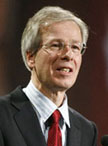 MONTREAL. SATURDAY, DECEMBER 2. 7:00 PM ET. The wide-open Liberal Party of Canada leadership convention focused more quickly than many were predicting. This morning’s second ballot results came in at: Michael Ignatieff – 31.6% ; Bob Rae – 24.1% ; Stephane Dion – 20.8% ; Gerard Kennedy -18.8% ; Ken Dryden – 4.7%. On the rules of the game Ken Dryden had to drop out for the third ballot. But the dramatic development was that Gerard Kennedy chose to do the same, and throw his support behind Stephane Dion. (So it’s not a “Kennedy-Dion” alliance, as some on this site had speculated not too long ago : it’s a “Dion-Kennedy” alliance.) Then Bob Rae had to drop out, and in the end Dion won on the fourth ballot, with 54.7% of delegate votes. In a year of many such things in Canadian politics, this finally proved just another big surprise.
MONTREAL. SATURDAY, DECEMBER 2. 7:00 PM ET. The wide-open Liberal Party of Canada leadership convention focused more quickly than many were predicting. This morning’s second ballot results came in at: Michael Ignatieff – 31.6% ; Bob Rae – 24.1% ; Stephane Dion – 20.8% ; Gerard Kennedy -18.8% ; Ken Dryden – 4.7%. On the rules of the game Ken Dryden had to drop out for the third ballot. But the dramatic development was that Gerard Kennedy chose to do the same, and throw his support behind Stephane Dion. (So it’s not a “Kennedy-Dion” alliance, as some on this site had speculated not too long ago : it’s a “Dion-Kennedy” alliance.) Then Bob Rae had to drop out, and in the end Dion won on the fourth ballot, with 54.7% of delegate votes. In a year of many such things in Canadian politics, this finally proved just another big surprise.
Does Stephane Dion’s Liberal dream team have a future?
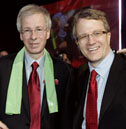 A lot of different people are saying a lot of different things about Stephane Dion, in the immediate wake of his surprising victory as new Liberal Party of Canada leader.
A lot of different people are saying a lot of different things about Stephane Dion, in the immediate wake of his surprising victory as new Liberal Party of Canada leader.
At one end of the spectrum, some say the Liberals have (maybe somewhat accidentally?) just made the best or at least a good choice, from the standpoint of both their own renewal and the broader long-term Canadian future. At the other end, others say they have just made the best conceivable choice from the standpoint of Stephen Harper’s Conservatives, Gilles Duceppe’s BQ, and Jack Layton’s NDP.
 It will no doubt be a while yet before it’s possible to seriously judge which end of the spectrum is closest to the truth. But if you’re looking for good signs, our immediate sense is that the best one so far has been Dion’s talk about the “Liberal dream team” he and all his seven final leadership rivals now present – in his victory speech, and in brief comments to Don Newman on CBC TV late Saturday night.
It will no doubt be a while yet before it’s possible to seriously judge which end of the spectrum is closest to the truth. But if you’re looking for good signs, our immediate sense is that the best one so far has been Dion’s talk about the “Liberal dream team” he and all his seven final leadership rivals now present – in his victory speech, and in brief comments to Don Newman on CBC TV late Saturday night.
As has been often enough noted, none of the eight candidates who started on the first ballot Friday was all that impressive and convincing in his or her own right – from a wide array of charismatic, likeabilty, policy, regional, strategic, winnability, and who know’s what other angles. And each had some particular liabilities of their very own.
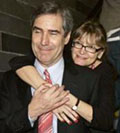 Yet one message the 2006 convention in Montreal seems to have underlined is that, collectively, the eight candidates do add up to a remarkable and impressive team of political leaders. A party that can attract such interesting and able people, and then build on and improve the political project that their (apparently) largely good-natured odyssey of the past 10 months has started, is not about to disappear from Canadian public life any time too soon.
Yet one message the 2006 convention in Montreal seems to have underlined is that, collectively, the eight candidates do add up to a remarkable and impressive team of political leaders. A party that can attract such interesting and able people, and then build on and improve the political project that their (apparently) largely good-natured odyssey of the past 10 months has started, is not about to disappear from Canadian public life any time too soon.
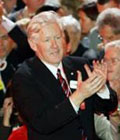 It could be that M. Dion’s first big test is in fact going to turn around just how well he can manage to keep the team together – as some original Gang of Eight that personifies and mobilizes a new era of Liberal renewal and Canadian development. (The future of Gerard Kennedy – born and raised in Western Canada – seems especially important.) On the traditional cynical (but often apt enough) understandings of the real world of Canadian politics, this is almost certainly not going to be easy at all. But if anyone among the eight had any realistic chance of going somewhere with any such new Liberal team leadership direction, it was arguably Stephane Dion. Who knows? Maybe that was really why he finally managed to win. And that, in any case, seems the most optimistic note on which to leave the subject for now.
It could be that M. Dion’s first big test is in fact going to turn around just how well he can manage to keep the team together – as some original Gang of Eight that personifies and mobilizes a new era of Liberal renewal and Canadian development. (The future of Gerard Kennedy – born and raised in Western Canada – seems especially important.) On the traditional cynical (but often apt enough) understandings of the real world of Canadian politics, this is almost certainly not going to be easy at all. But if anyone among the eight had any realistic chance of going somewhere with any such new Liberal team leadership direction, it was arguably Stephane Dion. Who knows? Maybe that was really why he finally managed to win. And that, in any case, seems the most optimistic note on which to leave the subject for now.
Earlier report: BRITNEY AND PARIS FAIL TO SHOW IN MONTREAL .. Canadian Liberals steam ahead anyway!
 MONTREAL. FRIDAY, DECEMBER 1, 2006. 5:00 PM ET. [UPDATED SAT., DEC. 2]. Britney Spears and Paris Hilton are apparently too busy clubbing in Southern California. But Howard Dean did kick things off Wednesday night, with greetings from the rising good guys in the land of the free. And last night was a fond farewell to Paul Martin, Jr., Prime Minister of Canada, 20032006.
MONTREAL. FRIDAY, DECEMBER 1, 2006. 5:00 PM ET. [UPDATED SAT., DEC. 2]. Britney Spears and Paris Hilton are apparently too busy clubbing in Southern California. But Howard Dean did kick things off Wednesday night, with greetings from the rising good guys in the land of the free. And last night was a fond farewell to Paul Martin, Jr., Prime Minister of Canada, 20032006.
Now the first ballot in the eight-person leadership race is underway. [And now make that second ballot in a five-person race.]The final speeches from the candidates have begun. [Or ended.] Whatever else, this is still a bubbling wide-open contest. [Still true as of 11 AM Saturday morning.] And we’re here for the duration, with ongoing updates and reports. Remember: the Liberal Party of Canada, on its own estimation, is one of the longest-lived and most successful political parties in the Western world. Britney and Paris don’t know what they’re missing. (And there are at least a few girls here in Montreal who don’t wear underwear too.)
First ballot results, early Saturday morning (and a few mid-morning updates) …
SATURDAY, DECEMBER 2. 12:30 AM ET. The first ballot results [see further below for background] have now been counted, as in the table immediately below.
UPDATE 11:30 AM SATURDAY: While still waiting for second-ballot results, something of a pattern has apparently started to emerge. Martha Hall Findlay threw her personal support to Dion, but both Joe Volpe and Scott Brison have gone to Bob Rae. Now convention floor scuttlebut says that Ken Dryden will be going to Bob Rae as well, after the second ballot on which he is almost certain to finish last. The longstanding theory that in the end it will be Bob Rae is starting to seem a little closer to the ultimate truth.
FIRST BALLOT RESULTS
Candidate | # Delegates | % Total |
Michael Ignatieff | 1,412 | 29.3 |
Bob Rae | 977 | 20.3 |
Stephane Dion | 856 | 17.8 |
Gerard Kennedy | 854 | 17.7 |
Ken Dryden | 238 | 4.9 |
Scott Brison | 192 | 4.0 |
Joe Volpe | 156 | 3.2 |
Martha Hall Findlay | 130 | 2.7 |
TOTALS | * 4,815 | ** 99.9 |
SOURCE: Liberal Party of Canada ; * Total registered delegates = 4,942 ; ** numbers don’t add to 100% due to rounding.
 As explained below, these numbers are inevitably quite similar to the official delegate count before the first ballot [see table below]. Stephane Dion has inched ahead of Gerard Kennedy. Joe Volpe has dropped noticeably from his official delegate numbers. (Apparently, significant numbers of his delegates did not finally show up.) And Martha Hall Findlay has done considerably better than her official delegate numbers.
As explained below, these numbers are inevitably quite similar to the official delegate count before the first ballot [see table below]. Stephane Dion has inched ahead of Gerard Kennedy. Joe Volpe has dropped noticeably from his official delegate numbers. (Apparently, significant numbers of his delegates did not finally show up.) And Martha Hall Findlay has done considerably better than her official delegate numbers.
None of these essentially modest changes, however, shed much light on the fun and games that will start with the second ballot later this morning, from 9:0011:00 AM – when all delegates are freed from their first ballot commitments, and the serious horse-trading and jockeying for position will begin.
 Even the question of whether it’s Dion or Kennedy who is in a position to challenge the notion of an eventual final showdown between Ignatieff and Rae remains fundamentally unanswered. With only two votes separating them on the first ballot, they are virtually tied. There seems some agreement that Kennedy gave a stronger final speech than Dion Friday night. And most of the first ballots were cast before the speeches had ended.
Even the question of whether it’s Dion or Kennedy who is in a position to challenge the notion of an eventual final showdown between Ignatieff and Rae remains fundamentally unanswered. With only two votes separating them on the first ballot, they are virtually tied. There seems some agreement that Kennedy gave a stronger final speech than Dion Friday night. And most of the first ballots were cast before the speeches had ended.
At the end of the speeches, as apparently planned for some time, Joe Volpe became the first of the eight candidates to choose to withdraw from the race. He has dropped out in favour of Bob Rae (but just how many of his 156 first-ballot delegates will choose to follow him on the second and subsequent ballots is unknown). Similarly, even though Martha Hall Findlay did much better on the first ballot than her prior official delegate count – and perhaps gave the, in some ways, strongest speech last night – she remains last on the list, and must now drop out.
Scott Brison has now dropped out as well. So the second ballot that started at 9:00 AM ET this morning has only five candidates: Ignatieff, Rae, Dion, Kennedy, and Dryden. And some are saying that it could take all of five ballots to finally arrive at a winner with a clear 50% plus one of all delegate votes. And that could just mean that we won’t know who has won until some time early Sunday morning.
Varying opinions on the speeches …
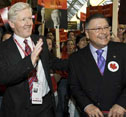 The speeches were given in reverse order of the pre first ballot delegate standings [in the table below]. And there seems considerable agreement that Martha Hall Findlay kicked things off with a barn-burning inspirational message that set the bar very high. Beyond this, the striking thing is how opinions on the speeches varied – suggesting that most such opinions are still understandably highly charged with promotional rhetoric for the various candidates.
The speeches were given in reverse order of the pre first ballot delegate standings [in the table below]. And there seems considerable agreement that Martha Hall Findlay kicked things off with a barn-burning inspirational message that set the bar very high. Beyond this, the striking thing is how opinions on the speeches varied – suggesting that most such opinions are still understandably highly charged with promotional rhetoric for the various candidates.
Setting Ms. Findlay’s inspirational kick-off message aside, some aspiring to more objectivity would say Ken Dryden was especially effective. As noted above, there seems some consensus that Kennedy gave a stronger speech than Dion. But while those sympathetic to Kennedy might reasonably urge that he gave an impressively strong speech, others remained unimpressed. (As almost resolutely objective observers, we’d give him pretty high marks, for the record.)
 On our own view, Kennedy looked more impressive until Bob Rae wound up with an almost surprisingly strong folksy and off-the-cuff performance. Others saw this as shaky at first, and only redeemed towards its end. Still others were critical because Bob Rae didn’t speak enough French, apparently just because he forgot in the heat of the moment. But some of the best parts of his speech were in French – where he sounded and even looked almost like a native of francophone Quebec.
On our own view, Kennedy looked more impressive until Bob Rae wound up with an almost surprisingly strong folksy and off-the-cuff performance. Others saw this as shaky at first, and only redeemed towards its end. Still others were critical because Bob Rae didn’t speak enough French, apparently just because he forgot in the heat of the moment. But some of the best parts of his speech were in French – where he sounded and even looked almost like a native of francophone Quebec.
Similarly, to us Michael Ignatieff gave only a very perfunctory if still quite professional speech, and sounded and looked like someone who has finally almost accepted that he can’t really win in the end, even if he is the front runner right now. But others again (especially among his continuing supporters) have urged that his speech was quite impressive. He is clearly the most “cosmopolitan” Canadian Liberal in the race (as are his supporters). Brison, Dryden, and Kennedy are “locals.” Dion and Rae try to effect some compromise between these two particular poles. But just which of Ignatieff, Rae, and one or the other of Dion and/or Kennedy will finally emerge as the new leader of the Liberal Party of Canada still seems very mysterious. Sometime later today, around noon, the next major clues to solving the mystery will appear.
The first ballot background [posted earlier] …
The polls for the first ballot in the leadership race opened at 3:00 PM ET, Friday, December 1, and will “remain open until one hour after all eight candidates have finished giving their speeches, expected to be about 10 PM ET.” The results “will be announced late Friday night or in the early hours Saturday.”
FINAL OFFICIAL DELEGATE COUNT BEFORE FIRST BALLOT
Candidate | # Delegates | % Total |
Michael Ignatieff | 1,377 | 29.3 |
Bob Rae | 943 | 20.1 |
Gerard Kennedy | 820 | 17.5 |
Stephane Dion | 753 | 16.0 |
Ken Dryden | 238 | 5.1 |
Joe Volpe | 226 | 4.8 |
Scott Brison | 181 | [3.8] 3.9 |
Martha Hall Findlay | 46 | 1.0 |
Undeclared | 112 | 2.4 |
TOTALS | 4,696 | [100.0] 100.1 |
SOURCE: Liberal Party of Canada
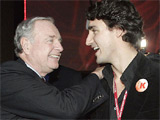 In some degree the first ballot is just a formality. Most of the convention delegates elected by the local riding associations are committed to vote for the candidates they were elected to support the first time around. So the results of the first ballot should bear some serious similarity to the official delegate count going into Montreal, as in the table above.
In some degree the first ballot is just a formality. Most of the convention delegates elected by the local riding associations are committed to vote for the candidates they were elected to support the first time around. So the results of the first ballot should bear some serious similarity to the official delegate count going into Montreal, as in the table above.
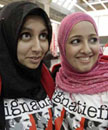 At the same time, just under 4,600 voting delegates are committed in this way [4,696 less 112 undeclared delegates in the table above]. And a “record 5,627 delegates and alternate delegates have registered.” Not all of these are voting delegates. The “the final number of eligible voting delegates” will be announced shortly. But it is already known that this number will at least include as many of the 4,696 from the table above as have finally shown up to vote, plus “748 so-called ex-officio delegates – former and current party officials, MPs and senators.”
At the same time, just under 4,600 voting delegates are committed in this way [4,696 less 112 undeclared delegates in the table above]. And a “record 5,627 delegates and alternate delegates have registered.” Not all of these are voting delegates. The “the final number of eligible voting delegates” will be announced shortly. But it is already known that this number will at least include as many of the 4,696 from the table above as have finally shown up to vote, plus “748 so-called ex-officio delegates – former and current party officials, MPs and senators.”
On preliminary rough horseback calculations, these numbers suggest, say, perhaps as many as 5,300 voting delegates on the first ballot – only less than 4,600 of whose intentions are already known. [As it happened in the end, there are only just under 5,000 voting delegates.] So especially in such a wide open race the final result of the first ballot could have some minor but intriguing and conceivably even significant departures from the table above. See the official Liberal leadership “results viewer” for data on the state of the race, once the first ballot results have been announced late Friday night or early Saturday morning.
The second ballot and beyond …
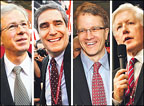 Polls will open for the second ballot at 9:00 AM Saturday, December 2. The candidate who finishes last in the first ballot will automatically be taken off the second ballot. Other candidates can withdraw for the second ballot if they choose as well (though at least two of the bottom four candidates in the table above have already indicated they will not be dropping off for the second ballot, unless they do wind up in the last spot).
Polls will open for the second ballot at 9:00 AM Saturday, December 2. The candidate who finishes last in the first ballot will automatically be taken off the second ballot. Other candidates can withdraw for the second ballot if they choose as well (though at least two of the bottom four candidates in the table above have already indicated they will not be dropping off for the second ballot, unless they do wind up in the last spot).
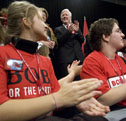 Polls for the second ballot will stay open for two hours. Party officials are currently saying that they will “need another hour or so to count.” If all goes well, this means that the second ballot results should be known not too long after noon Saturday. Delegates on this ballot are no longer bound to their first-ballot choices. It will provide the first indication of just which candidates have just how much future growth potential, on the long road to one of them arriving at the at least 50% plus one of the total vote, as required for victory.
Polls for the second ballot will stay open for two hours. Party officials are currently saying that they will “need another hour or so to count.” If all goes well, this means that the second ballot results should be known not too long after noon Saturday. Delegates on this ballot are no longer bound to their first-ballot choices. It will provide the first indication of just which candidates have just how much future growth potential, on the long road to one of them arriving at the at least 50% plus one of the total vote, as required for victory.
 Assuming no candidate takes a majority on the second ballot (which seems a virtual if not entire certainty), a third ballot will be held, hopefully sometime around or even before 1 PM. Again: “For that round and all subsequent rounds, the last-place finisher will be removed from the ballot. In addition, other candidates will have 20 minutes after the results are announced to drop off and move to another camp, although the defeated candidates will not be able to guarantee that all their supporters will follow them … Party officials estimate that each round of voting Saturday will take about three hours. The address by the new leader is planned for 7 PM ET.”
Assuming no candidate takes a majority on the second ballot (which seems a virtual if not entire certainty), a third ballot will be held, hopefully sometime around or even before 1 PM. Again: “For that round and all subsequent rounds, the last-place finisher will be removed from the ballot. In addition, other candidates will have 20 minutes after the results are announced to drop off and move to another camp, although the defeated candidates will not be able to guarantee that all their supporters will follow them … Party officials estimate that each round of voting Saturday will take about three hours. The address by the new leader is planned for 7 PM ET.”
 How many ballots will it take to arrive at a leader with 50% plus one? Will the “address by the new leader … planned for 7 PM ET” actually happen then? Or will it be much later? Will Bob Rae finally take it in any case, as the bookies across Canada are apparently now predicting? Or just who will it be? The race is interesting, even fascinating, because no answers to any of these kinds of questions are remotely predictable, even this close to the finish line. So stay tuned. More to come shortly here. As some official just said from the podium, “you can feel the electricity in the air.”
How many ballots will it take to arrive at a leader with 50% plus one? Will the “address by the new leader … planned for 7 PM ET” actually happen then? Or will it be much later? Will Bob Rae finally take it in any case, as the bookies across Canada are apparently now predicting? Or just who will it be? The race is interesting, even fascinating, because no answers to any of these kinds of questions are remotely predictable, even this close to the finish line. So stay tuned. More to come shortly here. As some official just said from the podium, “you can feel the electricity in the air.”
